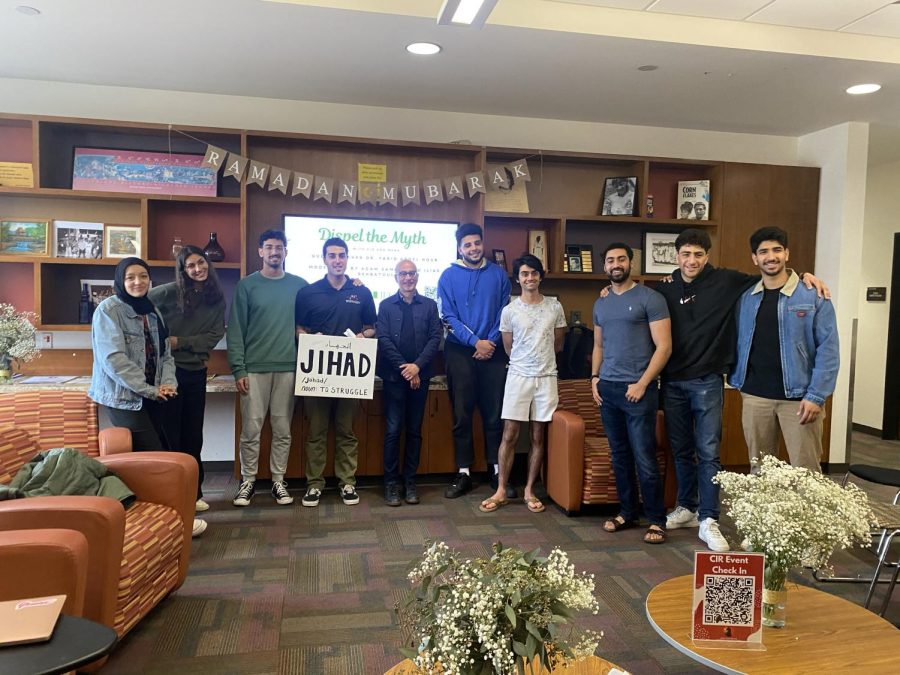“If a tree falls in a forest and no one is around to hear it, does it make a sound?”
So the old saying goes. But what if it is the same people hearing the tree fall over and over again?
San Diego State is presenting a series of events this April in honor of Southwest Asia and North Africa (SWANA) heritage month.
The second installment in the series was a “Dispel the Myth” event, featuring speaker Dr. Farid Abdel-Nour, political science professor and founder of the Center for Islamic and Arabic Studies. The event aimed to discuss common misconceptions and stigmas about SWANA communities.
The event was structured as an intimate conversation between the panelists and attendees. Abdel-Nour began with an introduction about the history of colonialism and its pervasive lingering effects, as well as the ways the same narratives are maliciously recycled and used to continuously perpetuate colonialist domination. Abdel-Nour spoke on U.S. hypocrisy, internalized oppression and the diversity within the region.
Abdel-Nour ended his introduction with a powerful statement.
“We cannot understand our situation here and nobody who is interested in supporting SWANA communities can succeed if they do not also understand the situation of the people in the regions we hail from,” Abdul-Nour said.
The following questions flowed like an open conversation. The diversity in the SWANA region was represented by attendees from different countries as they discussed their perspective and lived experience.
I looked around at the attendees nodding their heads in agreement. All 10 attendees had some sort of SWANA background. While there is no doubt that every single member in attendance had a lot to learn from what Abdul-Nour had to say, I kept asking myself, “what myth is being dispelled here?” These are not the people that believe in such myths.
Ultimately, nobody will champion SWANA awareness more than SWANA members. It is crucial that they are well educated and well versed in issues that affect them. But no real change will be made if members outside the community continue to perpetuate dangerous stereotypes about the community and actively harm SWANA members.
Attendees might go on and tell their friends of the power of Abdul-Nour’s words, the sharpness of his analysis and the impact it had on them. But the trickle down effect of information is never as effective as getting it directly from source. Reagan’s trickle down economics never worked too well either. Nothing compares to the experience of being present to hear the commanding, passionate presence of a speaker, and the inflection of the words they weave together.
When asked how one can support SWANA communities, Abdul-Nour remarked, “the old fashioned way.”
“One learns by reading and taking classes. Learning the relevant languages,” Abdul-Nour said. “There is no shortcut.”
Yet Abdul-Nour also mentioned how individuals can hardly capture someone’s attention nowadays for more than a few sound bites, even if the conversation requires 30 minutes to an hour.
It takes a significant level of dedication and to truly understand the complex issues the SWANA community faces, as Abdul-Nour said. But what is the goal here? To make every single person well-versed in SWANA issues? I would disagree. That expectation is simply not feasible or realistic.
Rather, I want to see more people attend events like the “Dispel the Myth,” whether its focus is political, social or cultural topics. I want people to see a sliver of someone’s experience and really listen to the diverse voices in the community. I want people to try cultural foods and converse with others. I want them to speak up the next time someone makes an Islamaphobic joke. I want them to truly understand the diversity in the community and begin to question U.S. domination in the region.
Ultimately, it is necessary to first increase awareness, and subsequently connect with the community through events such as these. From there on, people can delve into SWANA issues to the depth Abdul-Nour suggested if so desired.
To truly integrate the SWANA community and dispel the myths people hold about the region and those hailing from it requires cultivating acceptance and understanding. Events like this one are key to that cultivation. On a campus inundated with events, engaging and drawing people in is an ongoing challenge.
Yaya Khatib, a junior political science major, sees the value in starting small and getting people from all backgrounds foot in the door with light-hearted social events.
“Arab communities are a little bit less recognized or known (than Latino or Black communities). Our biggest stereotype is that we are scary and people do not want to associate with us,” Khatib said. “It is up to us to cultivate that community and create new ideas that they can associate with Arabs.”
The SWANA experience is much more than pain and suffering. Creating an opportunity for connection and visibility will ultimately create awareness. Exposure to the SWANA community will result in other communities being willing and able to attend events of a more serious scope.
So drag your friends to the next SWANA related event. Tell your Professors about the next event to share with students. Change the negative and damaging stereotypes. Challenge ignorance.
Speak up and show up.
Real change comes from connection with communities over shared struggles and experiences. Success requires a wide array of people to be informed and to support the issues SWANA community members face. Everyone needs to hear the tree fall.










